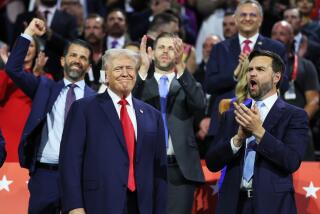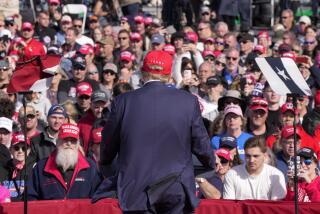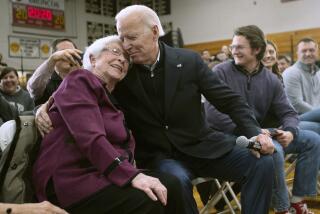Bush Defends His Stance Before 9/11
- Share via
NASHUA, N.H. — President Bush on Thursday rejected charges that he did not grasp the danger to the United States posed by Al Qaeda terrorists before Sept. 11, a claim his former counterterrorism chief made this week before a commission studying the terrorist attacks.
“Had I known that the enemy was going to use airplanes to strike America, to attack us, I would have used every resource, every asset, every power of this government to protect the American people,” the president said.
Bush delivered those remarks, his most extensive yet on the matter, without prompting at the start of a “conversation” on the economy at New Hampshire Community Technical College here.
His comments came a day after Richard Clarke, a former top national security official in the Bush White House and previous administrations, told an independent commission that Bush had failed to fully appreciate the urgent need to take action against Al Qaeda and Osama bin Laden. The commission was created by Congress to study government failures preceding the Sept. 11 attacks and its actions afterward.
Before launching into an hour-long discussion on the economy, Bush touted the actions he took to protect the nation after Sept. 11, 2001, such as the massive government reorganization that led to the creation of the Department of Homeland Security.
“We’re trying to do our solemn duty to protect America,” Bush said.
He cast the U.S.-led invasion of Iraq as part of those efforts. “Part of the war on terror is to -- is broader than just Al Qaeda.... You see, the lesson of September the 11th is we must deal with threats before they fully materialize. You can’t just see a threat and hope it goes away,” the president said, before calling former Iraqi leader Saddam Hussein “a threat to America or anybody else who loved freedom.”
Other administration officials also commented Thursday on the criticisms from Clarke, who said that the Bush administration ignored pleas from staff to focus more on Al Qaeda before the Sept. 11 attacks, and that its obsession with Iraq had hampered the war on terrorism ever since.
In addition to his testimony Wednesday, Clarke has laid out his complaints in a book, which was released Monday.
Defense Secretary Donald H. Rumsfeld said the risk to U.S. Air Force pilots patrolling no-fly zones over Iraq was the primary reason Hussein was widely discussed by top Bush administration officials from their first days in office.
“I came into office, and every day we were faced with the fact that the only place in the world where our planes and our air crews were being shot at was from Iraq,” Rumsfeld said.
But he told reporters at the Pentagon that Clarke was mistaken to say that senior administration officials ignored Bin Laden and the threat of the Al Qaeda terror network while focusing on Iraq.
“The way to answer the question is look what we did,” he said. “What did we do? We went into Afghanistan .... I mean, it doesn’t take a genius to figure that out.”
Rumsfeld also took issue with an assertion by Clarke that the Defense secretary insisted that instructions to prepare for an invasion of Iraq be included in a presidential directive that followed the Sept. 11 attacks.
“I can’t find anybody who knows me who thinks that I go around insisting to the president that he do something like that,” Rumsfeld said, “nor can I find anyone who was around during that period in senior levels who thinks that I even might have done something like that. I just can’t imagine where that comes from.”
Secretary of State Colin L. Powell on Thursday reiterated that terrorism was “an important issue for President Bush and for all of us” when the Bush administration took office in 2001.
“We were not unmindful of the fact that the Cole had just been attacked,” he said in testimony before a Senate subcommittee, referring to the lethal attack on the U.S. destroyer in Yemen in 2000. “We were not unmindful of the fact that our embassies had been blown up and terrorism was a danger.”
Powell said that his first administration briefing as Bush’s chief diplomat came from Clarke and other terrorism experts, and that the administration undertook many preventive steps before September 2001.
“The suggestion, however, that there was one magic moment or one magic bullet or one moment in time when you could connect two dots and say we know that these individuals are in our country, and we know that they are planning to fly planes into the World Trade Center, is not right,” Powell said.
“I’m not sure that, except in hindsight, could one have seen that the dots might have been connected in that way.”
Scott McClellan, the White House spokesman, continued the administration’s attack on Clarke’s credibility and motives for a fourth day, saying that Clarke had “a growing credibility problem.”
In recent days, the administration has also suggested that Clarke is leveling his criticisms to promote his book and because he holds a grudge over not getting the rank or attention he wanted.
“He stands by his past comments, which contradict his new assertions,” McClellan said Thursday. “And he continues to struggle to reconcile his changing story with those past comments. He continues to make statements that are flat-out wrong.”
Senate Democratic leader Tom Daschle of South Dakota accused the Bush administration of attempting “character assassination” against Clarke.
“They’ve known for months what Mr. Clarke was going to say,” Daschle said in a Senate speech.
“Instead of dealing with it factually, they’ve launched a shrill attack to destroy Mr. Clarke’s credibility.”
At the New Hampshire community college, Bush talked about the economy, using the experiences of local business owners and their employees to argue that his domestic agenda, especially the three tax cuts, had helped the economy rebound.
Bush said “the unemployment rate here in this state is 4.1%. That’s good, real good.” The rate nationally is 5.6%.
Countering Bush’s comments, former New Hampshire Gov. Jeanne Shaheen, a Democrat, derided the president for promising to create opportunities for U.S. workers while presiding over job losses. Shaheen spoke with reporters in a conference call arranged by the campaign of Massachusetts Sen. John F. Kerry, the presumed Democratic presidential nominee.
“The people of New Hampshire deserve an answer about why George Bush has no plan to create jobs,” Shaheen said. “In New Hampshire, we’ve lost one-fifth of our manufacturing jobs. George Bush’s only answer is to try to make permanent the tax cut for large corporations and the wealthiest Americans. He has a credibility problem.”
New Hampshire is one of about 16 swing states in this year’s presidential election. In the closely contested 2000 election, Bush won New Hampshire, 48% to 47%, taking the state’s four electoral votes.
From here, the president flew to Boston to attend a $1.2-million fundraiser for his reelection campaign.
At the Boston event, Bush accused Kerry of taking both sides on many issues. “His answers aren’t always so clear, but voters will have a clear choice in this campaign,” Bush said.
“Great events will turn on this election.... The security and prosperity of America are at stake.”
Bush is scheduled today to appear in New Mexico, another swing state, and in Arizona before stopping at his ranch near Crawford, Texas, for the weekend.
*
Chen reported from Nashua, N.H., and Boston. Schrader reported from Washington. Associated Press contributed to this report.
More to Read
Sign up for Essential California
The most important California stories and recommendations in your inbox every morning.
You may occasionally receive promotional content from the Los Angeles Times.













